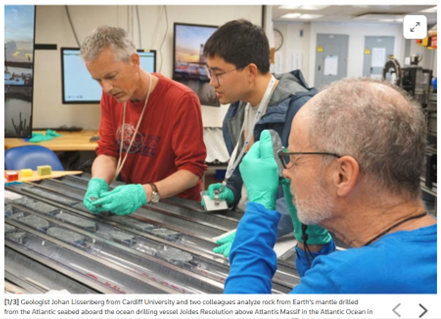Core provides research into the upper mantle
In April – June 2023, scientists using an ocean drilling vessel have dug the deepest hole ever in rock from Earth's mantle, penetrating 4,160 feet (1,268 meters) below the Atlantic seabed at the Atlantis Massif, near the Lost City Hydrothermal Field just west of the vast mid-Atlantic Ridge that forms the boundary between the North American plate and the Eurasian and African plates. The core sample recovered 2,907 feet (886 meters) of rock from the upper mantle. Core diameter was about 2-1/2 inches (6.5 cm).
The core sample is still being analysed. The researchers made some preliminary findings. "The mineral orthopyroxene in particular showed a wide range of abundance on a range of scales, from the centimetre to hundreds of meters," Lissenberg said. "We relate this to the flow of melt through the upper mantle. As the upper mantle rises up beneath the spreading plates, it melts, and this melt migrates up towards the surface to feed volcanoes."
"The reaction between seawater and mantle rocks on or near the seafloor releases hydrogen, which in turn forms compounds such as methane, which underpin microbial life. This is one of the hypotheses for the origin of life on Earth," Lissenberg said.
The article [ Scientists obtain deepest rock sample from Earth's mantle | Reuters ] did not mention the scientific instate undertaking this work, though it may have been the International Ocean Discovery Program (IODP). This is an international marine research collaboration that explores Earth's history and dynamics using ocean-going research platforms to recover data recorded in seafloor sediments and rocks and to monitor subseafloor environments. IODP expeditions are developed from hypothesis-driven science proposals aligned with the program's Science Plan Illuminating Earth's Past, Present, and Future and are carried out in accordance with the program's Principles of Scientific Investigation.
